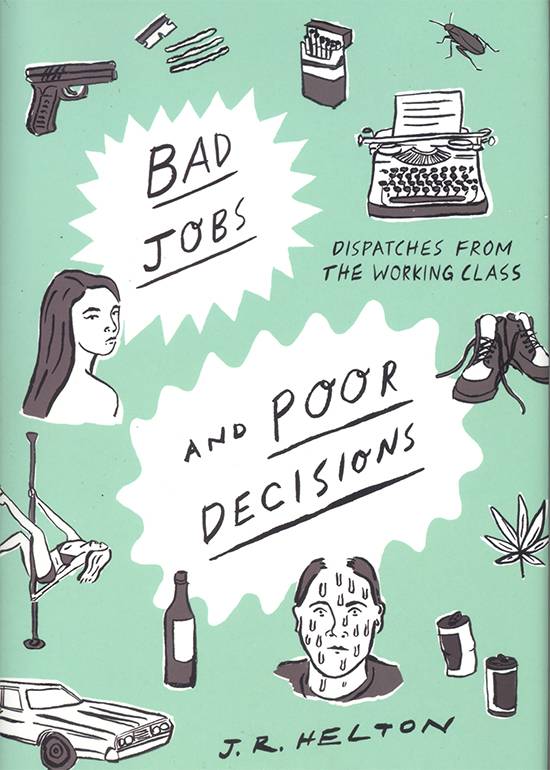Working Overtime

Bad Jobs and Poor Decisions: Dispatches from the Working Class
by J.R. Helton
New York: Liveright Publishing Corporation, 2018.
272 pp. $25.95 cloth.
Reviewed by
Jesse Garcia
In J.R. Helton’s memoir, Bad Jobs and Poor Decisions, he acts as a reporter to dead-end jobs, heavy drug usage, and his early attempts to become a writer. The memoir is broken into seven chapters that span from 1983 to 1989. The memoir begins in Austin after Jake (Helton’s alter-ego) drops out of the University of Texas to pursue writing, which doesn’t go exactly as planned. This leads Jake, and his wife Susan, to take menial jobs to afford rent, bills, drugs, and alcohol.
First Jake works as a painter in a quickly developing Austin. He moves on to selling bar-b-q pits, firewood, browning patches of St. Augustine grass, pumpkins, and Christmas trees. He works for his brother Alton, salvaging old railroad ties in Kansas alongside a group of undocumented workers. He takes a job painting the movie set his wife works on. But in the end, Jake is back at UT where he is painting dorms and returning to school.
I found this book remarkable because of Helton’s observations about the people he works with. Initially, it seems as if he is just describing stock characters from a Larry McMurtry novel, but the further you read you see Jake’s coworkers’ lives fall apart around him, and the tough-guy personas these characters have fade away to broken men. The most effective of these character sketches is when Jake works with a new foreman named Steve Hall. Steve is a talkative, depressed man who doesn’t care about work and takes long lunch breaks where he drinks a lot. On a lunch trip to a strip club, Steve tells a stripper about his dying mother and his dogs, according to Mr. Helton, “not for the titillation or a promise of future sex, but just to have someone listen to him.” It’s moments like this (and the many other quiet moments Jake shares with his coworkers) that make this memoir successful. It’s a memoir about Mr. Helton’s life by way of the people who orbit in and out of his life.
However, I felt Mr. Helton missed the mark with his relationship to Susan. While at some points it was nice to see that she wasn’t a flat character, most of the time, her portrayal feels one sided. The reader knows of their tumultuous relationship only through Mr. Helton’s descriptions. As of now, I feel like he wants the reader to despise her as much as he must. Including Susan in the story didn’t add anything useful for the reader to take away, and it simply seemed Mr. Helton just wanted the last word in the argument.
As someone who’s grown up around and doing manual labor, Mr. Helton’s memoir was wonderful to read. Jake reminds me of Larry McMurtry’s character Danny from All My Friends Are Going to be Strangers, except that instead of focusing on himself, Helton shares with the readers the stories of his bosses, his coworkers, and his family. The language throughout the book is toned down, but Jake becomes more alive as he ages. They’re written in a way where you could imagine sitting at a dive bar in Austin, listening to him recount his life to you, with the care and clarity of a writer, and some of the informality to makes these stories feel truly lived in. We get to see a character come full circle as a college burnout to someone who is focused and wants to succeed. Bad Jobs and Poor Decisions is a wonderful quick read for anyone curious about the working side of life.
Jesse Garcia is a graduate student at Texas State University. He is working on his MFA in Fiction.
